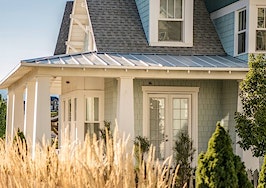Oregon Governor Kate Brown signed a quartet of housing bills Thursday including one that would eliminate single-family zoning in certain cities, a move that lawmakers believe will bring back much-needed “middle” housing.
“This session, we committed to significant investments that will help every Oregon family have a warm, safe, and dry place to call home,” Brown said in a statement. “No one single solution will address our housing crisis, and this legislation tackles the whole spectrum of issues, from homelessness, to stable rental housing, to increasing homeownership.”
HB2001, signed Thursday, requires cities with a population greater than 10,000 to “allow duplexes in lands zoned for single-family dwellings.” It also requires metro counties and cities with a population greater than 25,000 to allow “middle housing” in neighborhoods where zoning had previously only allowed single-family homes.
Middle housing typically refers to units that fall somewhere in between suburban-style single-family homes and high-density urban apartments. It includes small multi-family buildings like duplexes and four-plexes, as well as groups of tightly packed houses called “cottage clusters,”
Proponents of missing middle housing argue that it represents a more diverse range of home sizes and price points, which leads to greater affordability and neighborhoods that can accommodate greater diversity.
The state legislature passed the bill in early July – after being held up for several days while Republican lawmakers fled the state to avoid voting on a proposed climate change law. The zoning bill, however, gained bipartisan support once lawmakers returned, with 16 state senators voting in favor of it and nine voting against.
Minneapolis also recently voted to end single-family zoning last year.
The other housing bills signed into law Thursday include legislation requiring state agencies to conduct regional housing needs analyses and local housing production strategies, as well as a bill to create resources for domestic and sexual violence survivors, as well as low-income families seeking housing.






